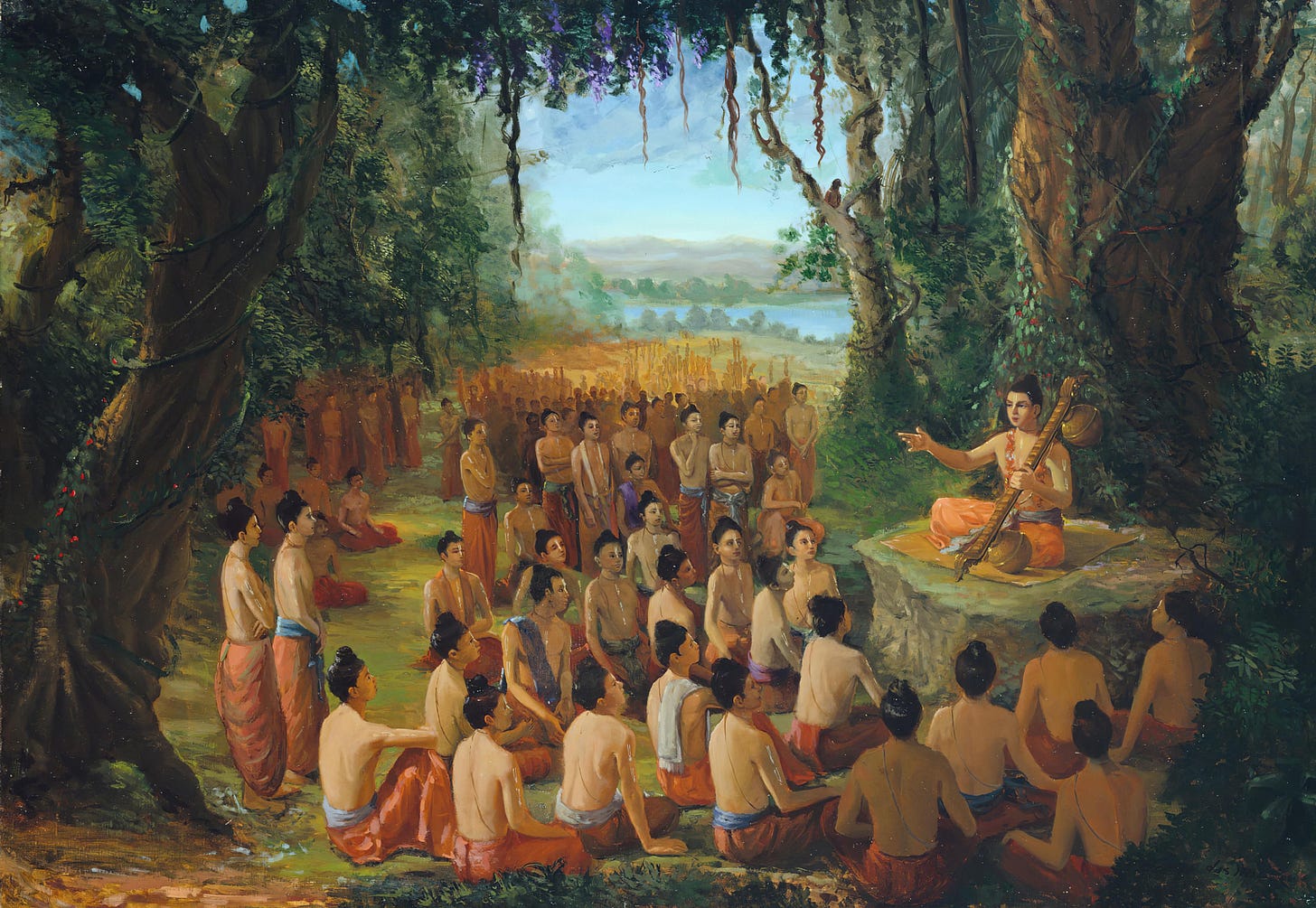1.1: athāto brahma-jijñāsā - It's time to enquire about the Absolute Truth.
Now, therefore [having come to the human form of life and attained education and other facilities], it's time to enquire about Brahman, the Absolute Truth.
« Vedānta-sūtra: The Govinda-bhāṣya of Baladeva Vidyābhūṣaṇa
Topic 1: Brahma-jijñāsādhikaraṇam - Inquiry into Brahman
The purpose of human life is to inquire about the Absolute Truth.
athāto brahma-jijñāsā
“Now, therefore, having come to the human form of life and attained education and other facilities, it is time to enquire about Brahman, the Absolute Truth.”
Sūtra 1.1.1 - Now it is time to enquire about the Absolute Truth
athāto brahma-jijñāsā
atha: now, thus, thereafter; ataḥ: therefore, hence; brahma: Brahman, the Supreme Personality of Godhead understood in three aspects, the Absolute Truth; jijñāsā: desire to know, inquiry, investigation.
Now, therefore, having come to the human form of life and attained education and other facilities, it is time to enquire about Brahman, the Absolute Truth.
Commentary: Śrīla Prabhupāda comments on this sūtra as part of his purport to SB 4.25.26:
“The first aphorism in the Vedānta-sūtra is athāto brahma-jijñāsā. In the human form of life one should put many questions to himself and to his intelligence. In the various forms of life lower than human life, the intelligence does not go beyond the range of life’s primary necessities, namely eating, sleeping, mating and defending. Dogs, cats and tigers are always busy trying to find something to eat or a place to sleep, or trying to defend and have sexual intercourse successfully. In the human form of life, however, one should be intelligent enough to ask what he is, why he has come into the world, what his duty is, who is the supreme controller, what is the difference between dull matter and the living entity, etc. There are so many questions, and the person who is actually intelligent should simply inquire about the supreme source of everything: athāto brahma-jijñāsā. A living entity is always connected with a certain amount of intelligence, but in the human form of life the living entity must inquire about his spiritual identity. This is real human intelligence. It is said that one who is simply conscious of the body is no better than an animal, even though he be in the human form. In Bhagavad-gītā (15.15) Śrī Kṛṣṇa says, sarvasya cāham hṛdi sanniviṣṭo mattaḥ smṛtir jñānam apohanam ca: “I am seated in everyone’s heart, and from Me come remembrance, knowledge and forgetfulness.” In the animal form the living entity is completely forgetful of his relationship with God. This is called apohanam, or forgetfulness. In the human form of life, however, consciousness is more greatly developed, and consequently the human being has a chance to understand his relationship with God. In the human form one should utilize his intelligence by asking all these questions.”
The whole purpose of material creation is to give a chance to the conditioned souls to revive their eternal nature. The Purāṇas explain that there are 8,400,000 forms of life in this universe, distributed amongst aquatics, plants, insects, lower animals, humans, and also higher beings, all the way up to Brahmā. Before attaining the human form, the soul has to pass through an extremely long evolutionary process, going through millions of different forms of plants and animals. In all these different species, there is some degree of intelligence and something to be learned, but only human beings have the higher intelligence necessary to understand philosophical topics. In all the lower species of life, the soul is fully immersed in the bodily conception of life, and thus works tirelessly just to maintain it. Only in the human form of life, there is the possibility of understanding our real nature as spiritual sparks transcendental to the body, starting the process of brahma-jijñāsā (inquiry into Brahman).
This understanding of our transcendental nature has two components. The first component is to understand our nature as spiritual beings, transcendental to the body. The second is to understand the Supreme Personality of Godhead, who is understood in three aspects: Brahman, Paramātmā, and Bhagavān (brahmeti paramātmeti, bhagavān iti śabdyate). Even though the Supreme Lord possesses three aspects, He is advayam, non-dual, and therefore the three are one and the same; it just depends on one level of understanding. When Vyāsadeva declares “athāto brahma-jijñāsā“, an impersonalist will understand we should inquire about the impersonal Brahman, a yogī that we should inquire about the localized Paramātmā inside the heart, and a devotee will see it as an invitation to inquire about the Supreme Personality of Godhead, who is both our origin and our destination. The nature of this transcendental Brahman is the main topic of the Vedānta-sūtra, which brings the conclusion of the Vedic literature.
However, even when we come to the point of trying to understand Brahman, there are many traps. The Vedas are like a desire tree containing all types of knowledge. Because most are interested only in the four materialistic religious principles of dharma, artha, kama, and mokṣa (mundane religiosity, economic development, material sense gratification, and impersonal liberation), the Vedas extensively explain how to achieve these goals in the karma-kanda section. For spiritually inclined people, there is the jñana-kanda section, which deals with spiritual knowledge, such as the Upaniṣads and the Vedānta-sūtra. This search for transcendental knowledge culminates in the Śrīmad-Bhāgavatam, which brings the highest knowledge, directly describing the Supreme Personality of Godhead. In this way, Śrīmad-Bhāgavatam is considered the essence or the ripened fruit of all Vedic literature.
Next: Light in the darkness from the scriptures »
You can also donate using Buy Me a Coffee, PayPal, Wise, Revolut, or bank transfers. There is a separate page with all the links. This helps me enormously to have time to write instead of doing other things to make a living. Thanks!
« Vedānta-sūtra: The Govinda-bhāṣya of Baladeva Vidyābhūṣaṇa



Liked your piece, thought you might resonate - I serve the song beneath the traps—the bass that bombings couldn’t own. https://thehiddenclinic.substack.com/p/what-i-found-in-the-smoke-that-the